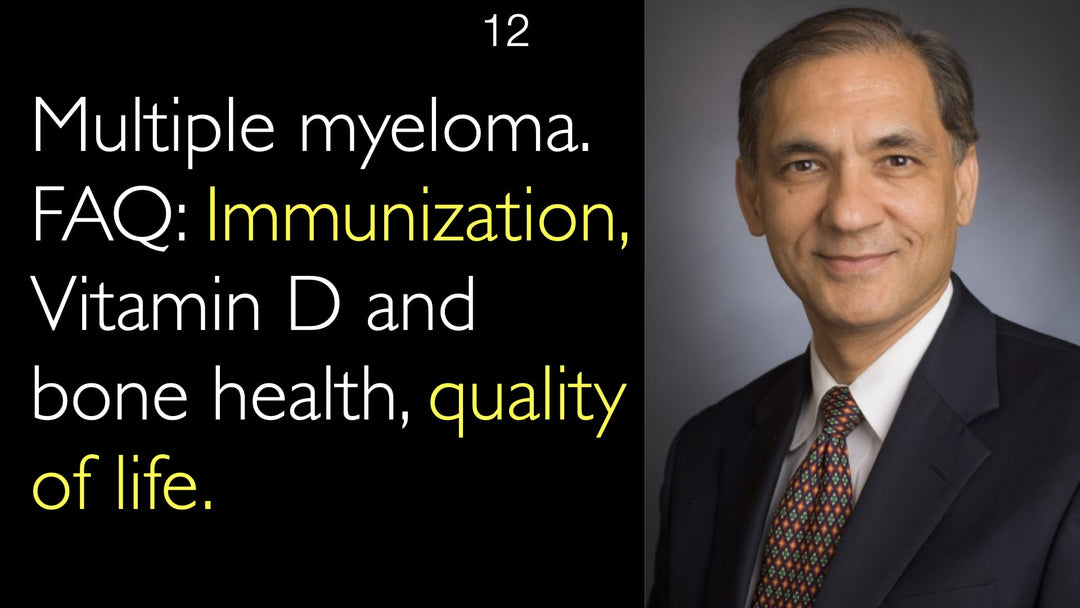Leading expert in multiple myeloma, Dr. Nikhil Munshi, MD, explains key patient concerns. He addresses COVID-19 vaccination and monoclonal antibody prophylaxis for immunocompromised patients. Dr. Munshi details the critical importance of bone health management through medication, vitamin D, and calcium. He emphasizes that modern treatments enable patients to achieve both long-term survival and an excellent quality of life.
Multiple Myeloma Patient Care: Immunization, Bone Health, and Quality of Life
Jump To Section
- COVID Vaccination in Myeloma
- Monoclonal Antibody Prophylaxis
- Myeloma Bone Health Management
- Bone Strengthening Medications
- Quality of Life Outcomes
- Full Transcript
COVID Vaccination in Myeloma
Dr. Nikhil Munshi, MD, confirms that COVID-19 vaccination is essential for multiple myeloma patients. He states that vaccination provides crucial protection. However, he clarifies that vaccine efficacy is not 100% in this immunocompromised population. Multiple myeloma patients remain at a higher risk for severe COVID-19 outcomes than the general public even after vaccination. Dr. Munshi advises that patients must continue other protective precautions.
Monoclonal Antibody Prophylaxis
Dr. Nikhil Munshi, MD, highlights the importance of preventative monoclonal antibody treatments. Agents like Evusheld™ (tixagevimab and cilgavimab) are recommended for myeloma patients. This is particularly critical for patients undergoing therapies that suppress the immune system. Dr. Nikhil Munshi, MD, explains that these prophylactic treatments are a key component of a comprehensive strategy to keep patients safe from infection.
Myeloma Bone Health Management
Bone disease is a fundamental aspect of multiple myeloma that requires active management. Dr. Nikhil Munshi, MD, emphasizes that taking care of the bones is critically important. A comprehensive approach includes a good diet, adequate vitamin D supplementation, and sufficient calcium intake. These measures work in concert with prescription bone-strengthening agents to support skeletal health and prevent complications.
Bone Strengthening Medications
Dr. Nikhil Munshi, MD, specifically recommends the continued use of agents that strengthen and support bone. These medications, such as bisphosphonates (e.g., zoledronic acid) or denosumab, are a standard part of myeloma treatment. They help reduce the risk of fractures, bone pain, and other skeletal-related events. This therapeutic approach is vital for maintaining patient mobility and overall quality of life.
Quality of Life Outcomes
A primary goal of modern multiple myeloma treatment is to preserve and enhance quality of life. Dr. Nikhil Munshi, MD, addresses a common patient question about living well, not just living longer. He confirms that with the many effective drugs now available, patients can expect a very good quality of life. Dr. Nikhil Munshi, MD, notes that patients often remain fully functional and can continue their professional and personal activities, enabling them to live a normal life.
Full Transcript
Dr. Anton Titov, MD: Professor Munshi, what are the top questions that patients with multiple myeloma ask you? And what are the questions that patients perhaps should ask, but they often don't ask as much?
Dr. Nikhil Munshi, MD: I think the question that comes up currently is concerning COVID. What precautions do I take? Do I take the vaccine or not? Do I take antibody treatment or not? An important component of that is: yes, they should take the vaccine. Number one, number two: myeloma patients, despite the vaccine, are at a higher risk than the general population. The vaccine protects, so you should do it, but it's not 100%.
You shouldn't take the same precaution that you would take otherwise. Some of the preventative methods, like with antibody treatment—Evusheld and others—should be utilized in this patient population. Especially if they're getting treated with certain treatments which can affect the immune system, they need to be followed with those preventative antibody treatments to keep them safe. So that's, I think, one very important component.
The second component is about their bone health. Multiple myeloma is a disease that involves bones, and taking care of the bone is critically important. There are agents that strengthen and support, and that should be continued. Good diet, vitamin D, calcium, along with those bone-strengthening agents, becomes a very important component of myeloma treatment.
Finally, a critically important thing in our field is to maintain quality of life. Patients ask: what would be my quality of life? All these treatments are great, but what is my quality of life?
The answer is that now that we have so many drugs, patients live longer. That's almost a given now. But they need to live a normal life; they live long, they need to live well. We are able to do this now with the drugs we have. The drugs we can modulate. The quality of life remains very good. They should remain functional, occupied professionally, and live a normal life.




